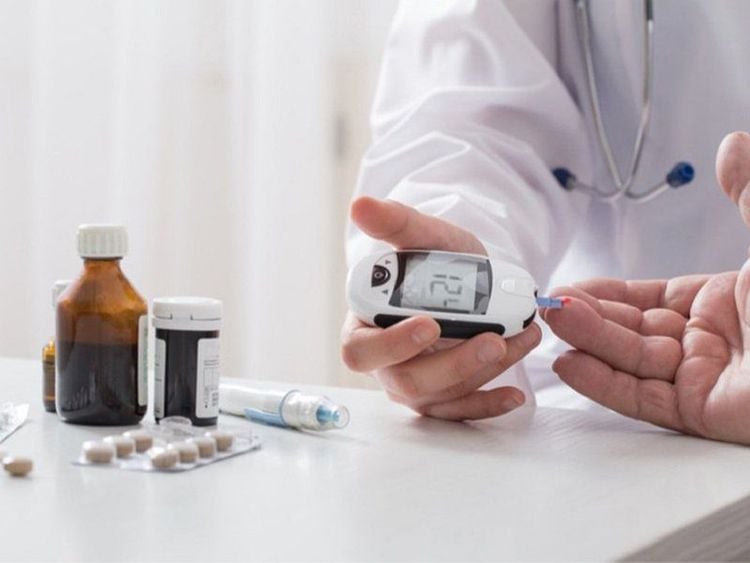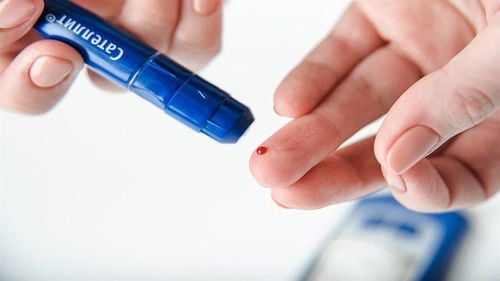This is an automatically translated article.
LADA type diabetes (latent autoimmune diabetes in adults) is a disease with complications similar to type 1 and 2 diabetes. Therefore, early diagnosis and testing of LADA type diabetes plays an important role. It is important in effective disease detection and treatment, and in reducing the risk of complications.
1. An overview of latent autoimmune diabetes in adults
Latent autoimmune diabetes in adults is also known as type 1.5 diabetes or late-onset type 1 diabetes. This is an inherited autoimmune disease that results from a condition in which the body misrepresents the pancreas as a foreign organ. The body responds by attacking and destroying insulin-producing cells on the beta islands of the pancreas. And that causes type 1.5 diabetes.
In the early stages, the disease manifests itself as type 2 diabetes, so it is often misdiagnosed as type 2 diabetes. However, type 1.5 diabetes is more similar to type 1 diabetes, although it is not classified in the same group. The latent autoimmune diabetes in adults is associated with a high risk of insulin dependence, with genetic similarities to type 1 diabetes, metabolic dysfunction, and autonomic features. exempt. However, the disease is not as common in children as type 1 diabetes.
2. Diagnostic criteria for latent autoimmune diabetes in adults
The diagnosis of type 1.5 diabetes is currently based on 3 criteria:
Onset of diabetes in adulthood: Usually around 30 years of age; Presence of autoantibodies against pancreatic islet cells are: GAD, ICA, IAA: Presence of at least 1 anti-islet autoimmune antibody is required. IAA and IA2A are less important, diagnosis is mainly based on finding anti-GAD and ICA antibodies; No need to use insulin for at least 6 months after diagnosis: Used to differentiate type 1.5 diabetes from type 1 diabetes.

Cần chẩn đoán đái tháo đường tự miễn tiềm ẩn ở người lớn sớm để tránh gây ra những biến chứng nghiêm trọng
3. Diagnostic tests for latent autoimmune diabetes in adults
The following are tests to help differentiate type 1.5 diabetes:
Diabetes autoantibodies list: GAD, RIA; Differential diagnostic test between type 1.5 and type 2 diabetes: islet cytoplasmic autoimmune antibodies IFA, IgG; islet cell complement-fixing autoimmune antibodies; fluorescent indirect antibodies; islet cell complement-fixing autoimmune antibodies; islet cell autoimmune antibody assessment; RIA: Anti-IA2, Anti-Insulin, Anti-GAD; insulin antibodies. These are tests for early diagnosis of type 1 diabetes, differential diagnosis between type 1.5 diabetes and type 2 diabetes. Besides, it is also used for differential diagnosis of gestational diabetes and risk prediction. a family member with type 1 diabetes, monitoring the clinical course of type 1 diabetes; Microplate ELISA: Anti-IA2, Anti-GAD, Anti-GAD/IA2 Pool; GAD antibodies. This is a test that helps diagnose type 1 diabetes, differentiate between type 1.5 diabetes and type 2 diabetes. It is also used to differentiate gestational diabetes, predict the risk of type 1 diabetes in familial, controls the prognosis of type 1 diabetes; C-peptide: A test that measures the remaining function of beta cells. The test helps to detect the level of insulin secretion. Patients with type 1.5 diabetes often have lower and lower insulin levels as the disease progresses. People with type 2 diabetes who are insulin resistant often overproduce insulin.
4. When to screen for type 1.5 diabetes?
There are 5 common clinical indicators in patients with latent autoimmune diabetes in adults. It is suggestive of screening:
Age of onset: Under 50 years old; Body mass index (BMI): Under 25kg/m2; There are obvious clinical symptoms: Drinking a lot of water, urinating a lot and losing weight; Personal history: Have other autoimmune diseases; Family history: Have an autoimmune disease. People with two or more of the above criteria have a higher risk of developing type 1.5 diabetes. Patients with 1 or less of these criteria usually do not have type 1.5 diabetes. However, it should be noted that patients with type 1.5 diabetes still have a high rate of overweight and obesity, so it may be necessary to perform an anti-GAD antibody test to screen for the disease, avoiding the risk of missed.
Detecting LADA type diabetes has important implications in disease treatment and prevention of complications. Therefore, people at high risk of disease should perform screening tests, if detected, they should strictly follow the treatment instructions of the doctor.
Currently, Vinmec International General Hospital has been and continues to deploy the Cardiovascular and Diabetes Screening Package with the following outstanding advantages:
Made by a team of doctors - doctors who are the first experts industry, highly qualified, dedicated and wholeheartedly for the benefit of the patient. With 90% having university degrees, 20% being professors and associate professors, nearly 30% having doctorate degrees, bringing high efficiency in medical examination and treatment. Comprehensive and professional medical examination, consultation and treatment services. The system of modern equipment, supports effective diagnosis and treatment. Modern, civilized, luxurious and sterile medical examination and treatment space.
Please dial HOTLINE for more information or register for an appointment HERE. Download MyVinmec app to make appointments faster and to manage your bookings easily.













